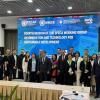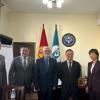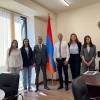News
Displaying Results 1 - 25 of 52
The COVID-19 pandemic and the regional conflicts have negatively affected economic development in Eastern Europe and the South Caucasus (EESC), significantly disrupting international trade, investment and cooperation. To achieve a resilient recovery and support the transition to knowledge-based and…
In recent years, Montenegro and its capital city, Podgorica, have been committed to accelerate sustainable and smart urban development through a variety of ambitious national and regional and local measures, such as digitalization of public services, modernization of public transport, and to…
In a rapidly evolving world, grappling with climate change and the triple planetary crisis, transformative innovation stands as a crucial solution to these pressing challenges. Strategic learning is increasingly recognized as a key component in both ecosystem development and the broader realm of…
With a long history of reliance on resource-based industries for growth, countries of the United Nations Special Programme for the Economies of Central Asia (SPECA) - Afghanistan, Azerbaijan, Kazakhstan, Kyrgyzstan, Tajikistan, Turkmenistan, and Uzbekistan - have embraced the power of innovation…
The building industry currently accounts for 39% of global energy-related CO2 emissions, 11% of which result from manufacturing building materials and products such as steel, cement, and glass. And yet, to date, emission reduction efforts have not really focused on decarbonizing the construction…
UNECE presented its innovation policy insights during the Small Business Act for Europe (SBA) stakeholder meeting at the Organisation for Economic Cooperation and Development (OECD) on 19 June 2023 in Paris. This meeting was a platform for experts on small and medium enterprises (SME) policy,…
Countries in the Eastern Europe and South Caucasus (EESC) sub-region (Armenia, Azerbaijan, Georgia, the Republic of Moldova, and Ukraine) must boost their efforts to diversify and upgrade their economies through innovation for long-term, sustainable growth and resilience, in light of recent crises…
According to the UNECE Smart Sustainable Cities profile for Tbilisi, presented today in the capital of Georgia, the city has made important efforts in implementing the 2030 Agenda for Sustainable Development, capitalizing on the growth opportunities generated by the Association Agreement between…
The transition towards a circular economy could create an estimated 4.5 trillion USD of global economic growth by 2030, while helping to restore natural systems. Within the landlocked countries of Central Asia, this transition can help economies diversify away from a dependence on exports of finite…
Innovation and Technology, which is the focus of this year’s International Women’s Day, presents powerful opportunities for gender equality, and offers welcome hope at a time of great challenges for women’s empowerment. In fact, the regional progress report on the Sustainable Development Goals (…
UNECE is mobilising international architects to help the city of Mykolaiv, Ukraine’s ninth largest city, to develop a forward-looking, people-centred master plan for its reconstruction.
Since July 2022, UNECE has engaged One Works, an international design company in Milano, Italy, to provide…
It is critical that construction industry’s general contractors, architects and governments find ways to innovate and incorporate minimum efficient standards and innovations, such as architectural upcycling and recycling, through proper and updated legislative frameworks and rules as well as…
Despite a marked overall improvement over the last ten years of the economic picture in Bishkek, Kyrgyzstan, urban planning lagged, and the development of basic and social infrastructure did not keep up with population increase, particularly in informal settlements. According to estimates shared…
During its recent mission in Turkmenistan, a UNECE delegation presented a proposal for a new analytical project - “Trade and Innovation for Sustainable Development of Turkmenistan” - to the government and international stakeholders, aimed at supporting the country to enhance innovation governance…
Eight years remain to achieve the United Nations Sustainable Development Goals (SDGs), and yet, the world is not on track to attaining most of the targets. We are far from a fully realized circular economy transition, or from limiting the rise in global temperatures to 1.5 degrees Celsius.
The…
Innovation will be crucial for rebuilding Ukraine’s economic and social systems to ensure the country’s long-term prosperity, resilience and sustainability. To support Ukraine in addressing these challenges, UNECE organized a study tour to Geneva for three Ukrainian officials.
The study tour (14-…
The impact of the COVID-19 pandemic and consequent economic slowdown, as well as the widespread negative repercussions of the regional conflicts, such as disruptions in international trade and investments, have made it increasingly difficult for the Eastern Europe and South Caucasus (EESC)…
As part of UNECE’s effort to support innovation-led, sustainable development in Armenia, UNECE’s Innovative Policies Development (IPDS) makes progress in identifying binding constraints to innovation during a fact-finding mission to Yerevan.
Aimed at providing a comprehensive assessment of…
The buildings and construction sector accounted for 36% of final energy use and 39% of energy and process-related carbon dioxide (CO2) emissions in 2018. According to the Intergovernmental Panel on Climate Change, building materials including steel, cement and glass emitted over 2.2 Gigatonnes of…
Governments, Mayors, leading architects, urbanists and experts will gather in San Marino on 3-6 October 2022 for the 83rd session of the UNECE Committee on Urban Development, Housing and Land Management. The session will support regional exchange of experiences and good practices to promote…
Public procurement represents 10 per cent of Georgia’s GDP. Therefore, innovation-enhancing procurement (IEP) can be a powerful policy lever to catalyze innovation and promote sustainability. Using public procurement to drive innovation is one of the recommendations arising from the Innovation for…
Cities and urban areas have been at the epicentre of the COVID-19 pandemic which has drastically impacted the urban economy, including public services, employment and infrastructure, affecting all, but foremost the most vulnerable groups of the population. To support cities in their recovery from…
The Covid-19 pandemic continues to hit hard the countries of the United Nations Special Programme for the Economies of Central Asia (SPECA) and highlights the need to diversify from current, resource-dependent models of economic development. This will mean putting ‘innovation and technology that…
Countries of the Eastern Europe and the South Caucasus (EESC) sub-region (Armenia, Azerbaijan, Georgia, the Republic of Moldova, and Ukraine) have a lot of potential to continue the transition to a more sustainable economic growth model that is less vulnerable to external shocks. Innovation, or…
Countries in the UN Special Programme for the Economies of Central Asia (SPECA) are falling behind potential on many metrics of innovation performance. R&D spending remains below 1 per cent of GDP, almost entirely publicly funded, and SPECA countries rely extensively on natural resources,…


























